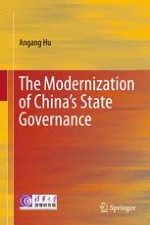
2017 | OriginalPaper | Chapter
1. The Construction of China’s State System
Authors : Angang Hu, Xiao Tang, Zhusong Yang, Yilong Yan
Published in: The Modernization of China’s State Governance
Publisher: Springer Singapore
Activate our intelligent search to find suitable subject content or patents.
Select sections of text to find matching patents with Artificial Intelligence. powered by
Select sections of text to find additional relevant content using AI-assisted search. powered by